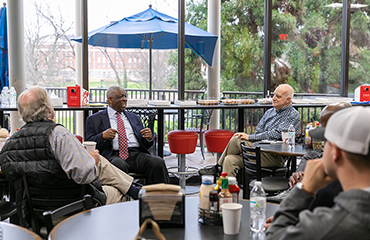
During an intimate Monday morning breakfast at Lander University, State Senator Floyd Nicholson shared his first-hand experiences of one of the darkest days in state history, the Orangeburg Massacre. Lander's Diversity Advisory Council sponsored the event as part of Black History Month.
"Being personally involved in an event like that is completely different than watching it on television," he said. "I clearly remember crawling on the ground with bullets flying over."
The tragedy occurred in February 1968, when Nicholson was a freshman at South Carolina State University in Orangeburg. According to Nicholson, there was a gradual buildup of tension before gunfire broke out.
"Near our campus, there was a bowling alley for white people only. One night, a group of students went in but left peacefully," Nicholson recalled. According to reports, the owner of the bowling alley felt the business was immune to desegregation because it was private. The tensions grew stronger when students returned the next night. A team of police officers was waiting, though, and beat and arrested several students.
In response, students started a bonfire the next night at the front of the SC State campus to protest the treatment of the police. "The entire campus was surrounded by National Guardsmen, state highwaymen and local police officers," Nicholson said.
While most students began to retreat, someone threw either a brick or rock towards the officers. In response, several officers opened fire - killing three students and injuring 27 others. "Most of them were shot in the back while trying to escape," Nicholson said.
Even though then-Governor Robert McNair requested the Federal Bureau of Investigations (FBI) to investigate the tragedy, an investigation at the state level was never requested. While the FBI did charge nine state patrol officers with using excessive force, they were later acquitted. Cleveland Sellers, a then 23 year old from Bamberg who was shot by police that night, was convicted of riot related charges stemming from events at the bowling alley. After seven months in prison before being released for good behavior, was eventually pardoned, and became program director for the Student Nonviolent Coordinating Committee.
Now 70, Nicholson says he harbors no ill feelings about what happened. "Of all the years I've seen, I'll never forget the year 1968. That's in the past, though, and it cannot be changed. As long as we don't let something go, we cannot grow. We have to learn to let go of the past. The key is on focusing on changing the environment, not the past. I don't want to regress, I want to go forward."
Moving forward is something Nicholson has done very well. After graduating from SC State, he returned to Greenwood and focused on public service. He taught in the Greenwood district schools and served as Mayor of Greenwood for 14 years. In 2009, he was elected to represent District 10 (Greenwood, Abbeville, McCormick and Saluda Counties) in the State Senate, and he continues to serve in that capacity.